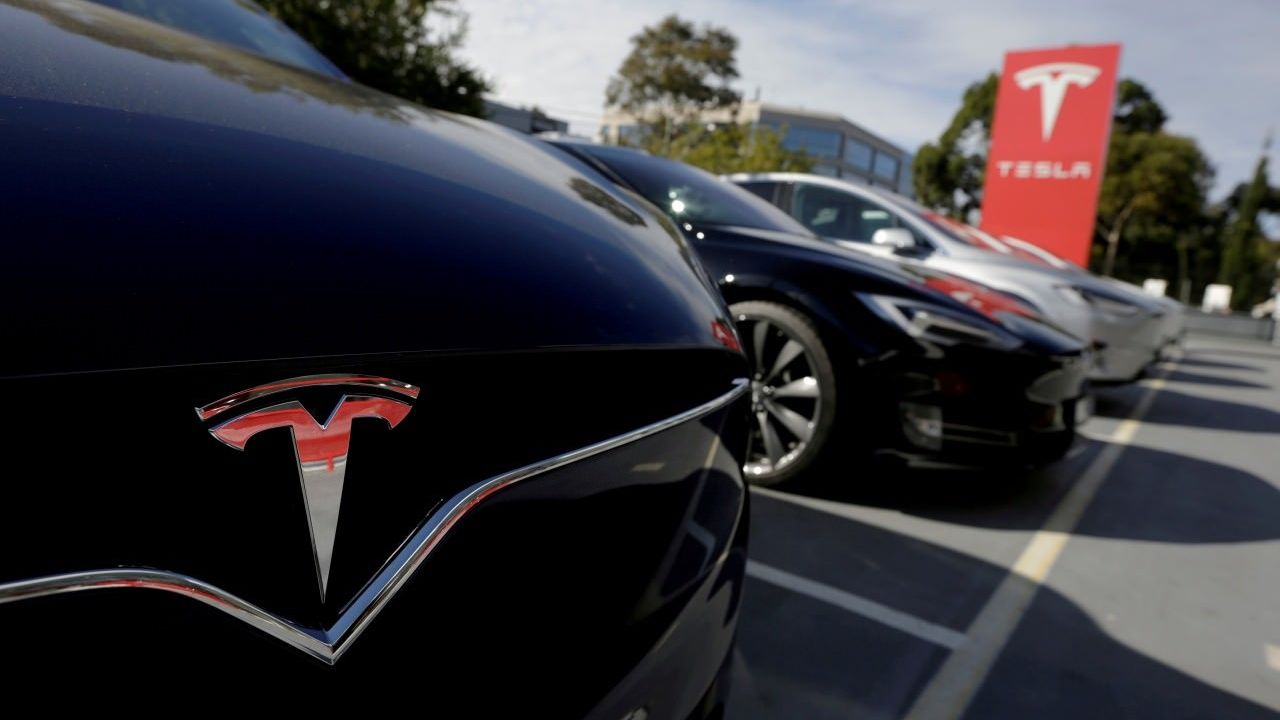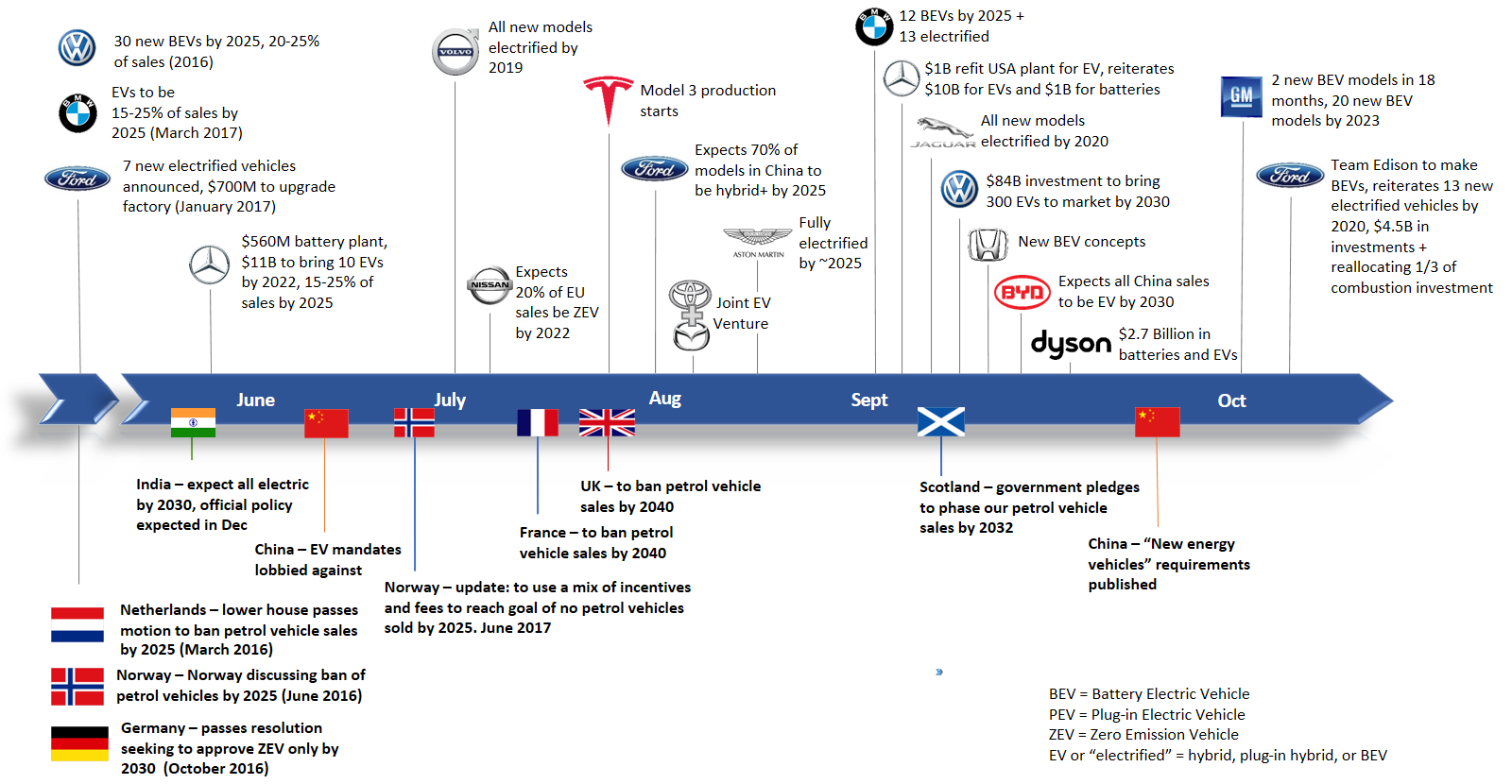

News
Tesla ushers in the age of EVs and the demise of the gas-guzzler
This year could start the beginning of the end for the internal combustion engine. Heck, The Economist gave the internal combustion engine an obituary this year in a recent cover story. And, according to Peter Holley at the Washington Post, “when future auto historians look back, they may pinpoint 2017 as the year electric vehicles went from a promising progressive fad to an industry-wide inevitability.”
Holley points out a number of signposts surfacing this year that pose a threat to the diesel and gas-powered automobile. The internal combustion engine (ICE) may be on… ummm, thin ice. So, as we look at the events unfolding this year, what indictors are contributing to this tectonic shift in the auto sector?
1. Tesla Model 3 ushers in the age of electric vehicles
Of course at the top of our list is the “the debut of Tesla’s Model 3” this year. Holley writes, “The company’s first mass-market vehicle has ushered in an era of excitement about EVs because of the car’s slick design and starting price of around $35,000.” But don’t let that lower price point fool you, Tesla is poised to achieve healthy margins for the Model 3 too.
2. China is going electric
China has proved a massive market opportunity for Tesla. And CEO Elon Musk may soon be announcing a Tesla factory in Shanghai. China’s also the world leader in electric vehicle sales by a wide margin. It’s reported that, “in addition to setting aggressive production quotas for EVs, China plans to scrap internal combustion engines entirely as soon as 2030. By taking a lead role in the shift to plug-ins, the world’s largest auto market is forcing the rest of the international community to follow in its footsteps.” And, other countries are following China’s lead.
Above: China takes the lead in electric vehicles (Youtube: Wall Street Journal)
3. Gas stations are installing electric vehicle chargers
Gas stations have been taking some unlikely cues from Tesla. And, “some experts believe electric cars have sounded the death knell of the American gas station.” John Abbott, Shell Oil’s business director admits, “We’re looking at having battery charging facilities.” This past week Shell signed an agreement to buy the electric vehicle charging company, NewMotion, which, “operates more than 30,000 private electric charge points for homes and businesses in the Netherlands, Germany, France and the U.K.”
4. Auto mechanics have less work to do
Electric cars require far less maintenance than gas-powered cars. “One of the primary reasons that auto owners visit a mechanic is for an oil change, which raises a question: What happens when vehicles no longer rely on oil? It’s not that electric vehicles won’t require maintenance (they still have brakes, tires and windshield wipers, after all), but their engines are far simpler, experts say.” Tony Seba, a clean energy expert, notes that electric vehicles, “have 20 moving parts, as opposed to 2,000 in the internal combustion engine… [and] are far cheaper to maintain.”
5. Big Auto announces electrifying plans
Jessica Caldwell, analyst at Edmunds admits, “You really do feel like this electrification thing is suddenly very real… There’s a momentum we haven’t really seen before. It’s coming from other countries around the world and from big automakers, and that’s forcing everyone else to comply.” Although, to be fair, it’s conceivable some of Big Auto’s EV announcements could just be feel-good window dressing for their brands. After all, legacy automakers are using some crafty wordplay hyping electrified cars instead of all-electric cars.

Above: Announcements from automakers (and countries) committing themselves to an electric vehicle future (Image: Teslarati)
6. Environmental impact of fossil fuel powered cars
With tales of cartels and collusion surrounding Germany’s dirty diesel programs, public perception is starting to shift. And the research is conclusive, electric vehicles are cleaner. Gina Coplon-Newfield, Director of Sierra Club’s Electric Vehicles Initiative explains, “Depending on how electricity is produced in your region, plug-ins are from 30 percent to 80 percent lower in greenhouse gas emissions.” She notes if companies like GM step up with plans to launch EV fleets, reductions in carbon emissions and improvements in air quality could be “hugely beneficial.”
===
Note: Article originally published on evannex.com, by Matt Pressman
Source: Washington Post
News
Tesla begins Robotaxi certification push in Arizona: report
Tesla seems serious about expanding its Robotaxi service to several states in the coming months.

Tesla has initiated discussions with Arizona transportation regulators to certify its driverless Robotaxi service in the state, as per a recent report from Bloomberg News. The move follows Tesla’s launch of its Robotaxi pilot program in Austin, Texas, as well as CEO Elon Musk’s recent comments about the service’s expansion in the Bay Area.
The Arizona Department of Transportation confirmed to Bloomberg that Tesla has reached out to begin the certification process for autonomous ride-sharing operations in the state. While details remain limited, the outreach suggests that Tesla is serious about expanding its driverless Robotaxi service to several territories in the coming months.
The Arizona development comes as Tesla prepares to expand its service area in Austin this weekend, as per CEO Elon Musk in a post on X. Musk also stated that Tesla is targeting the San Francisco Bay Area as its next major market, with a potential launch “in a month or two,” pending regulatory approvals.
Tesla first launched its autonomous ride-hailing program on June 22 in Austin with a small fleet of Model Y vehicles, accompanied by a Tesla employee in the passenger seat to monitor safety. While still classified as a test, Musk has said the program will expand to about 1,000 vehicles in the coming months. Tesla will later upgrade its Robotaxi fleet with the Cyercab, a two-seater that is designed without a steering wheel.
Sightings of Cybercab castings around the Giga Texas complex suggests that Tesla may be ramping the initial trial production of the self-driving two-seater. Tesla, for its part, has noted in the past that volume production of the Cybercab is expected to start sometime next year.
In California, Tesla has already applied for a transportation charter-party carrier permit from the state’s Public Utilities Commission. The company is reportedly taking a phased approach to operating in California, with the Robotaxi service starting with pre-arranged rides for employees in vehicles with safety drivers.
News
Tesla sets November 6 date for 2025 Annual Shareholder Meeting
The automaker announced the date on Thursday in a Form 8-K.

Tesla has scheduled its 2025 annual shareholder meeting for November 6, addressing investor concerns that the company was nearing a legal deadline to hold the event.
The automaker announced the date on Thursday in a Form 8-K submitted to the United States Securities and Exchange Commission (SEC). The company also listed a new proposal submission deadline of July 31 for items to be included in the proxy statement.
Tesla’s announcement followed calls from a group of 27 shareholders, including the leaders of large public pension funds, which urged Tesla’s board to formally set the meeting date, as noted in a report from The Wall Street Journal.
The group noted that under Texas law, where Tesla is now incorporated, companies must hold annual meetings within 13 months of the last one if requested by shareholders. Tesla’s previous annual shareholder meeting was held on June 13, 2024, which placed the July 13 deadline in focus.
Tesla originally stated in its 2024 annual report that it would file its proxy statement by the end of April. However, an amended filing on April 30 indicated that the Board of Directors had not yet finalized a meeting date, at least at the time.
The April filing also confirmed that Tesla’s board had formed a special committee to evaluate certain matters related to CEO Elon Musk’s compensation plan. Musk’s CEO performance award remains at the center of a lengthy legal dispute in Delaware, Tesla’s former state of incorporation.
Due to the aftermath of Musk’s legal dispute about his compensation plan in Delaware, he has not been paid for his work at Tesla for several years. Musk, for his part, has noted that he is more concerned about his voting stake in Tesla than his actual salary.
At last year’s annual meeting, TSLA shareholders voted to reapprove Elon Musk’s compensation plan and ratified Tesla’s decision to relocate its legal domicile from Delaware to Texas.
Elon Musk
Grok coming to Tesla vehicles next week “at the latest:” Elon Musk
Grok’s rollout to Tesla vehicles is expected to begin next week at the latest.

Elon Musk announced on Thursday that Grok, the large language model developed by his startup xAI, will soon be available in Tesla vehicles. Grok’s rollout to Tesla vehicles is expected to begin next week at the latest, further deepening the ties between the two Elon Musk-led companies.
Tesla–xAI synergy
Musk confirmed the news on X shortly after livestreaming the release of Grok 4, xAI’s latest large language model. “Grok is coming to Tesla vehicles very soon. Next week at the latest,” Musk wrote in a post on social media platform X.
During the livestream, Musk and several members of the xAI team highlighted several upgrades to Grok 4’s voice capabilities and performance metrics, positioning the LLM as competitive with top-tier models from OpenAI and Google.
The in-vehicle integration of Grok marks a new chapter in Tesla’s AI development. While Tesla has long relied on in-house systems for autonomous driving and energy optimization, Grok’s integration would introduce conversational AI directly into its vehicles’ user experience. This integration could potentially improve customer interaction inside Tesla vehicles.
xAI and Tesla’s collaborative footprint
Grok’s upcoming rollout to Tesla vehicles adds to a growing business relationship between Tesla and xAI. Earlier this year, Tesla disclosed that it generated $198.3 million in revenue from commercial, consulting, and support agreements with xAI, as noted in a report from Bloomberg News. A large portion of that amount, however, came from the sale of Megapack energy storage systems to the artificial intelligence startup.
In July 2023, Musk polled X users about whether Tesla should invest $5 billion in xAI. While no formal investment has been made so far, 68% of poll participants voted yes, and Musk has since stated that the idea would be discussed with Tesla’s board.
-

 Elon Musk1 week ago
Elon Musk1 week agoTesla investors will be shocked by Jim Cramer’s latest assessment
-

 Elon Musk3 days ago
Elon Musk3 days agoElon Musk confirms Grok 4 launch on July 9 with livestream event
-

 Elon Musk16 hours ago
Elon Musk16 hours agoxAI launches Grok 4 with new $300/month SuperGrok Heavy subscription
-

 News7 days ago
News7 days agoTesla Model 3 ranks as the safest new car in Europe for 2025, per Euro NCAP tests
-

 Elon Musk2 weeks ago
Elon Musk2 weeks agoA Tesla just delivered itself to a customer autonomously, Elon Musk confirms
-

 Elon Musk1 week ago
Elon Musk1 week agoxAI’s Memphis data center receives air permit despite community criticism
-

 Elon Musk2 weeks ago
Elon Musk2 weeks agoTesla’s Omead Afshar, known as Elon Musk’s right-hand man, leaves company: reports
-

 News2 weeks ago
News2 weeks agoXiaomi CEO congratulates Tesla on first FSD delivery: “We have to continue learning!”
















